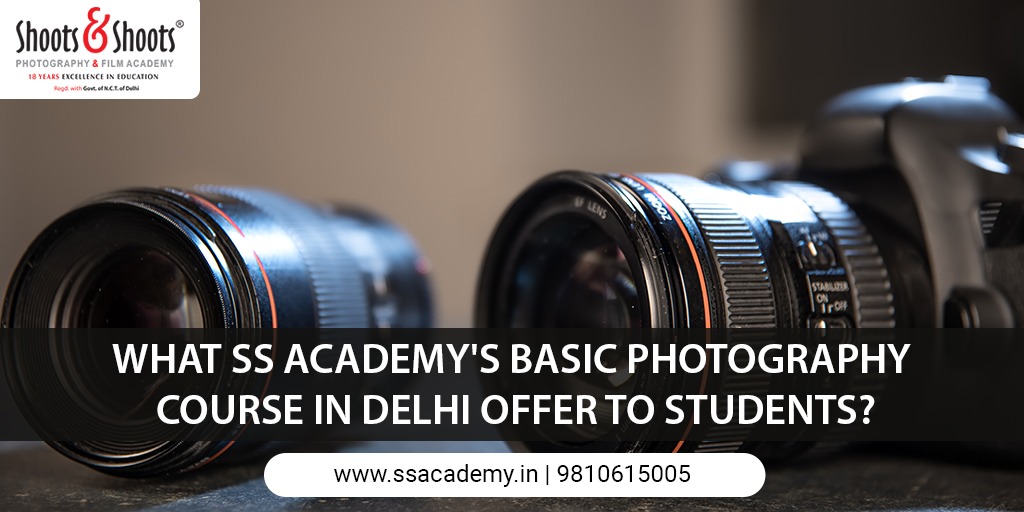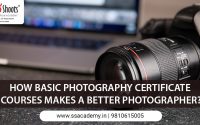What SS Academy’s Basic Photography Course in Delhi offer to students?
Many claims to be the best when it comes to a basic photography course in Delhi. However, not all of them can match the depth of knowledge and competence that the Shoots & Shoots institution offers to its students.
We feel that information is the most important factor in creating great pictures. Proper knowledge may make all the difference in your photos, regardless of the format you use. The result can be raised to the next level by comprehending and commanding the fundamental parts.
However, it is up to students to choose and learn this craft and become proficient at it without sacrificing their appreciation of art. Of course, it’s easier said than done.
That is why, in our course, SS Academy aims to cover all of the core and sectional components necessary to make anyone a successful photographer. Below, we go thru what we teach in our basic photography course in considerable detail.
What does the SS Academy offer?
Now, let’s go over everything you get to learn when you enroll in SS Academy’s 2 monthly basic photography courses in Delhi:
- Types of the camera and its handling: how to effectively handle the analog camera and master the technical process of the digital camera.
- Tripod and its handling: how to carry, store, and handle a tripod, especially outside the comfort of your home or the studio on the go.
- Lenses / Optics (e.g., 35mm): you learn how what lens matters where? and what lens is essential for every photographer to use, in particular the 35mm lens that captures the world in the same way as the human eye.
- Film speed / ISO: mastering them, means dealing with the technical process that all captures the picture and footage effectively regardless of the environment
- Exposure (Theory & Practical): You’ll learnone of the fundamentals of exposure in both theoretical and practical applications.
- Aperture (F): An aperture can be defined as the opening in a lens thru which light passes to enter the camera. It is an easy concept to understand, but difficult to master.
- Basic Depth of Field by (f): For many cameras, depth of field (DOF) is the distance between the nearest and the farthest objects that are in acceptably sharp focus in an image.
- Shutter Speed (S.S.): What is the shutter speed? Why does it matter? What speed matters where? e.g. 24 frames per second usage
- Camera settings inside and outside: understanding the camera, all its settings, and hardware that might affect your work.
- Metering Mode: Metering is how your camera determines what the correct shutter speed and aperture should be, depending on the amount of light that goes into it.
- Exposure Point and Focus Point: What is the point of exposure and what is its relationship to the focus point? Why does it matter in the first place?
- How to lock exposure and focus: How to masterfully lock exposure and ensure great focus during the photography process.
- Shooting Modes (M, TV, AV, S, A, P, Full Auto, and Full Auto without flash): What are all these different modes? And where to use them?
- Image Format and its Quality: What are the different types of image formats and how to ensure their quality when you import them into a PC or when you export them out of correction software?
- Manual & Auto Focus: How to effortlessly switch between manual and autofocus mode in your camera
- White Balance: What is white balance and how do you use it to your advantage?
- Color Temperature: the basics of color theory and how color temperature.
- Basic Composition: how composition is an essential element in every great work of art, as well as practice knowledge for how to compose an impactful image.
- Types of light N.L. & A.L.: what are a type of light are there and what to use where?
- The reflector and its use show all types of reflectors: how reflectors can be great when shooting or filming in natural light.
- How to make reflectors: How to make your light reflectors
- Basic studio shooting with Tungsten or Continues Light: in and out of studio light; both theatrical and practical knowledge.
- Portraits, mid-and full-length shoots in studio and outdoors: how to make use of all styles portraits, mid-range, and wide range.
- Basic product shooting in studio with tungsten light: in and out of the basics of the intricate art of product shooting.
- Basic Night Photography: How to Get Good Images at Night (Theory & Practical knowledge)
- How to shoot multiple exposures: how to use multiple exposures to enhance your image.
- How to Shoot Fantastic Light Trails for Maximum Effect: Theoretically and practically, light trails.
- Outdoor daylight shootings are like: how to shoot in natural light anywhere outdoors.
- Zoo photography: how to beautifully capture nature, monuments, birds, and animals.
- Portraits, people, and landscapes: how to beautifully capture portraits, people, and landscapes.
- Show and Discussion on Outdoor Daylight Shoot: Additional talks on how to capture the world and people without being affected by the natural light
- Basic Photoshop Editing: How to Master Photoshop Skills So you can get the effect and the impact you want out of your work.
- Basic Photography Course Portfolio: how to create and maintain an impressive portfolio for future opportunities
- Photography Tours: And you will get the chance to be a part of several photography tours in Delhi or even outside of Delhi, all to experience the real professionalism and fun that comes with being a photographer.
Conclusion
Hopefully, you’ve been inspired and are looking forward to continuing your trip. As you can see, this is only a quick rundown of the main event. The SS Academy’s professional veterans give students much more than conceptual frameworks and expertise in the basic photography course in Delhi. So come to one of our courses today.





